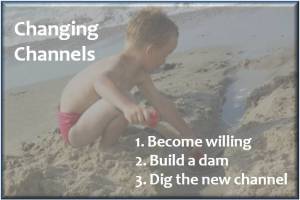 Picture yourself playing with a baby who is just learning to walk. Perhaps the baby is an excellent crawler and has learned to pull herself up to a standing position and “cruise” from one piece of furniture to the next. She has never, however, taken a “solo” step – without holding on. As you sit on the floor, separated from her by a few feet, you hold out your arms and encourage her to come to you. You tell her she can do it. You call to her. You encourage her in every way you know how.
Picture yourself playing with a baby who is just learning to walk. Perhaps the baby is an excellent crawler and has learned to pull herself up to a standing position and “cruise” from one piece of furniture to the next. She has never, however, taken a “solo” step – without holding on. As you sit on the floor, separated from her by a few feet, you hold out your arms and encourage her to come to you. You tell her she can do it. You call to her. You encourage her in every way you know how.
She takes one step – maybe two. Then she abruptly sits down. Hard. Tears start to form in her eyes. Which of the following do you say?
- “You are such a failure. You will never learn to walk.”
- “I know, honey, walking is too hard. Don’t worry. I don’t mind carrying you.”
- “Yay! You did it! You took 2 steps all by yourself! You can do it! You can do it again! Come on. Come to me!”
Number 3, of course. You want her to learn to walk. You know she doesn’t know how. But she is ready to learn and anxious to learn, and she doesn’t know that there is anything wrong with not being very good at it yet. She doesn’t cry if you don’t encourage her to feel sorry for herself. She smiles at your encouragement. Any tears that have started have dried up, and she crawls over to the couch, pulls herself up, and tries again.
We may not be learning to walk, but we are children of God figuring out how to do other things that we need to learn, only now we know what failure is, and we try to avoid it at any cost. We don’t want anyone to know if we cannot do something that we think is important. We certainly don’t want anyone to know that we tried and failed.
Do you think your Heavenly Father is standing by with judgmental statements like number one and number two above? Do you think He wants us to give up on things we haven’t mastered yet? Or even things that we haven’t even attempted yet at all? No! He is standing right by us saying, “You can do it! I have confidence in you!” If we, as mortal parents, want our children to succeed, how much more does God, our perfect and eternal Father, want us to succeed!
We need to let go of our fear of failure and recognize it as a stepping stone to a new skill. Failing means we aren’t perfect yet. Failing means we are trying to learn. Failing means we want to grow.
You can do it! I know you can! God knows you can! You know you can. You just need to keep trying and no matter what, DON’T…GIVE…UP!!!
- What skill do you want to learn or habit do you want to change?
- Regardless of how many times you have tried and failed, are you willing to try again?
- Make a plan for learning this new skill. How can you take the Lord up on His promise to help you? (See Moroni 7:33)
- Solicit the help of others who have been placed by God in your path to help you.
- Follow through on your plan and don’t give up.






